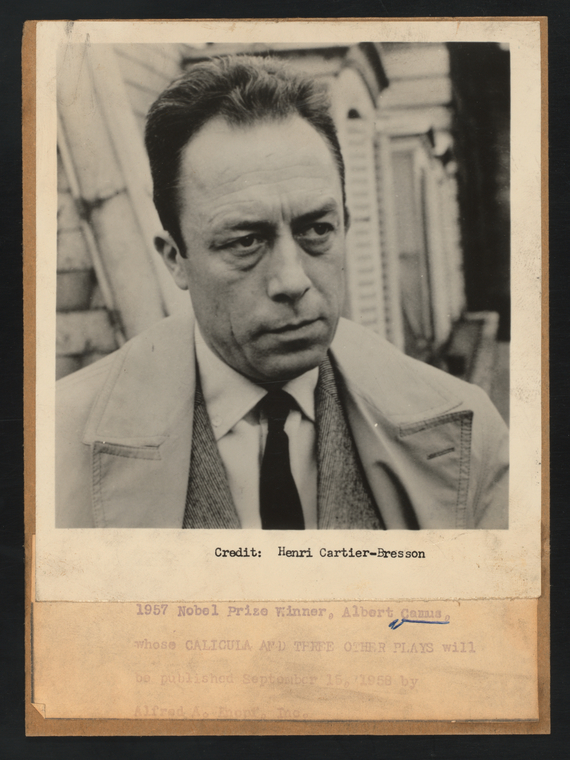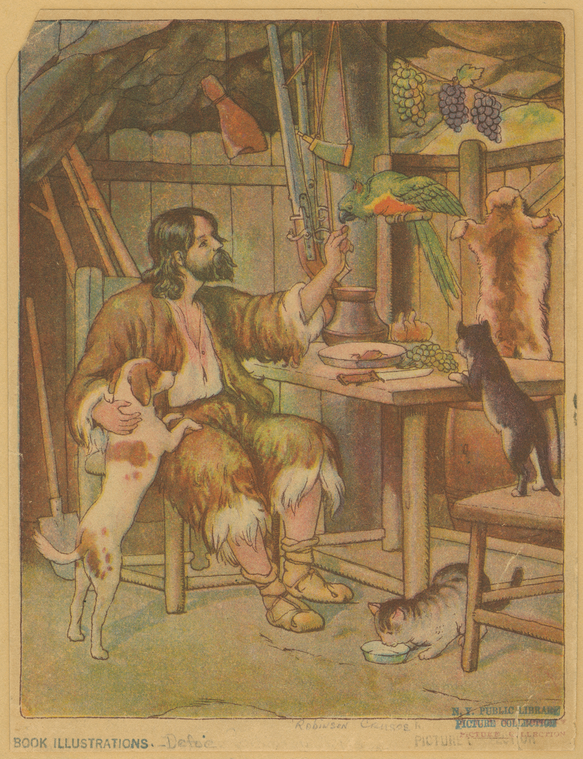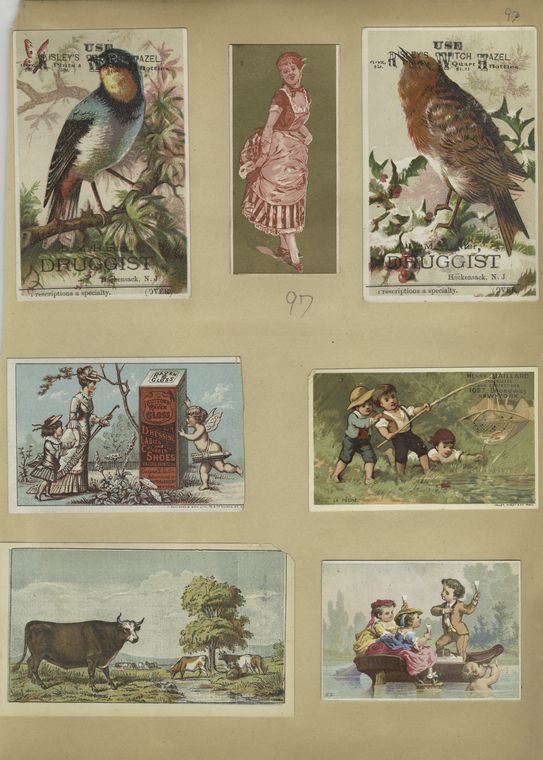Invitation to a Book Social: Open Book Night at Mid-Manhattan
by Jessica Cline, Picture Collection, Stephen A. Schwarzman Building
March 3, 2015
Our February Open Book Night discussion was a success! We shared books over hot tea on a very cold evening and talked about books we love.
Reader's Den: The Stranger, Part 3
by Jessica Cline, Picture Collection, Stephen A. Schwarzman Building
January 26, 2015
For further reading on themes found in The Stranger, try these titles.
Reader's Den: The Stranger, Part 2
by Jessica Cline, Picture Collection, Stephen A. Schwarzman Building
January 14, 2015
This week we look at the author, Albert Camus, and offer a few questions for discussion.
Reader's Den: The Stranger by Albert Camus
by Jessica Cline, Picture Collection, Stephen A. Schwarzman Building
January 6, 2015
I hope you will find it a relief to spend January reading a novel that takes place in the full sun of the Algerian summer, although the story may not bask so lazily in your mind. Also, it is a novella, so it won’t be too difficult to stick to your New Year’s resolution to read more.
Art Books: Various Small Books: Referencing Various Small Books By Ed Ruscha
by Jessica Cline, Picture Collection, Stephen A. Schwarzman Building
September 4, 2014
“In plain sight, but overlooked, the gas station excites interest in Ruscha” (p. 21), but also serves as a document of the everyday world that co-exists with our routine and triggers our nostalgia as we see it change over time.
Art Books: Mother by Elinor Carucci
by Jessica Cline, Picture Collection, Stephen A. Schwarzman Building
May 8, 2014
When mothers think about mothering, there are a certain set of emotions that come rolling over them combined with images of their children that are not always smiling and cute. It is more often a warm hand reaching for yours, a tear-wetted cheek pressing your arm, the waking in the middle of the night, an open mouth showing you missing teeth. So, when I opened Elinor Carucci’s book of photography called Mother, I was welcomed into a familiar world.
The Reader's Den: Epistolary Poetry for April
by Jessica Cline, Picture Collection, Stephen A. Schwarzman Building
April 7, 2014
The Den is warm today
With April sun
Just in time
For Poetry Month!
More epistolary poetry: letters in the form of a poem.
Reader's Den: The Consolations of the Forest, Conclusion
by Jessica Cline, Picture Collection, Stephen A. Schwarzman Building
February 25, 2014
Having arrived safely back to your everyday existence, I hope you enjoy the comfort of your own bed and convenient grocery store, but feel as if you have had a bit of retreat into nature and your own thoughts.
Reader's Den: The Consolations of the Forest, Week 3
by Jessica Cline, Picture Collection, Stephen A. Schwarzman Building
February 19, 2014
Welcome back for the third week of our reading and discussion of Sylvain Tesson’s The Consolations of the Forest. This week I’d like to offer a few more questions to consider and discuss while you are reading the book:
Reader's Den: The Consolations of the Forest, Week 2
by Jessica Cline, Picture Collection, Stephen A. Schwarzman Building
February 11, 2014
The Consolations of the Forest is Sylvain Tesson’s first title available in English and it won the Prix Médicis for nonfiction. But, he has written many other works on his travels around the world by bike and in Central Asia, including crossing the Himalayas on foot. He was born in Paris, France in 1972.
Reader's Den: The Consolations of the Forest by Sylvain Tesson
by Jessica Cline, Picture Collection, Stephen A. Schwarzman Building
February 3, 2014
This month’s Reader’s Den will encourage you to try an exploratory journey to Siberia with Sylvan Tesson as he lives alone for six months in a cabin taking in the beauty of winter and the arrival of spring in The Consolations of the Forest.
Art Books: Black and Blue by Carol Mavor
by Jessica Cline, Picture Collection, Stephen A. Schwarzman Building
November 20, 2013
Black and blue is a phrase of the wounded, the beaten, and the marked. But, they are also colors of the night, the ocean, the eye, and shadows, places of mystery and beauty.
Carol Mavor's Black and Blue: The Bruising Passion of Camera Lucida, La Jetée, Sans soleil, and Hiroshima mon amour looks to cinema and art to expose memories through imagery and senses. Mavor takes the gallery of images that fill Black and Blue and
Art Books: Llyn Foulkes
by Jessica Cline, Picture Collection, Stephen A. Schwarzman Building
August 7, 2013
At 78 years old, Llyn Foulkes is due a wider audience and encouraging recognition. He is a painter and a musician, but his paintings often take on sculptural qualities and collage, while his interest in music has developed from leading a crowded ensemble into a one-man band extravaganza on his homemade instrument, called the Machine. To celebrate his artistic accomplishments, the Hammer Museum in Los Angeles put together a retrospective exhibition and an accompanying
Art Guide: Socially Conscious Art
by Jessica Cline, Picture Collection, Stephen A. Schwarzman Building
June 17, 2013
"I think it's a responsibility for any artist to protect freedom of expression and to use any way to extend this power." Ai Weiwei, "Ai Weiwei 'Does Not Feel Powerful'"BBC, October 13, 2011.
Ai Weiwei was commenting on being named the most powerful person in the art world in 2011 by ArtReview magazine after
Reader's Den: Leaving the Atocha Station by Ben Lerner Wrap up
by Jessica Cline, Picture Collection, Stephen A. Schwarzman Building
March 25, 2013
I hope you have enjoyed reading Leaving the Atocha Station by Ben Lerner. Listed below are suggestions of novels, poetry and non-fiction that might also be of interest to you.
The Tennis-Court Oath by John Ashbery (1957)
Contains poem Leaving the
Reader's Den: Leaving the Atocha Station, Week 3
by Jessica Cline, Picture Collection, Stephen A. Schwarzman Building
March 18, 2013
Atocha Station, Madrid via Wikimedia CommonsWelcome to the third week of reading Leaving the Atocha Station by Ben Lerner. As you are nearing the end of the novel and as we just passed the anniversary of the terrorist attack on Atocha Station (March 11, 2004), there are a few themes to ask questions about or consider further.
Leaving the Atocha Station provides a glimpse into the everyday
Reader's Den: Leaving the Atocha Station by Ben Lerner, Week 2
by Jessica Cline, Picture Collection, Stephen A. Schwarzman Building
March 11, 2013
The author of Leaving the Atocha Station, Ben Lerner, is originally from Kansas and has a BA in political science and an MFA in creative writing from Brown University. He was a 2003-2004 Fulbright Scholar in Spain and he currently teaches in the English Department at Brooklyn College. Leaving the Atocha Station is Lerner's first novel,
Reader's Den: Leaving the Atocha Station by Ben Lerner, Week 1
by Jessica Cline, Picture Collection, Stephen A. Schwarzman Building
March 4, 2013
Welcome to the Reader's Den for March. This month we will be discussing Leaving the Atocha Station by Ben Lerner. It is a novel set in Spain, written by a New York author. The novel follows Adam Gordon to Madrid in 2004 on a fellowship to write poetry influenced by the Spanish Civil War. We learn about Adam's relationships as a poet-tourist-student and his process of writing and self-discovery through experiences outside of his control.
Adam awakes in Madrid, Spain, follows his
Aging Creatively at Mid-Manhattan Library: The Art of Making Poems - Creation and Craft
by Jessica Cline, Picture Collection, Stephen A. Schwarzman Building
January 23, 2013
"She saw the moon, she saw the birds, she saw the little shoes, in summer, before swimming pools filled up — strong and empty and waiting"
~from The Shoes
Enter the world of teaching poet and published author Hermine Meinhard. From here, enter your subconscious, and write what you find. Ms. Meinhard will be there to help you along.
Mid-Manhattan Library is pleased to offer a free ten-week workshop with Hermine
Silhouettes, Shadows and Shades
by Jessica Cline, Picture Collection, Stephen A. Schwarzman Building
December 20, 2012
As the new movie Hitchcock has recently come into theaters, I am reminded of the silhouette so eloquently drawn at the beginning of the television series Alfred Hitchcock Presents. Before photography was a household staple, silhouettes provided an inexpensive way to record someone's likeness. And, as with Mr. Hitchcock, a shadow is often stunning in its ability to capture the likeness of a person or to tell a story.
The
 With your library card, it's easier than ever to choose from more than 300,000 e-books on SimplyE, The New York Public Library's free e-reader app. Gain access to digital resources for all ages, including e-books, audiobooks, databases, and more.
With your library card, it's easier than ever to choose from more than 300,000 e-books on SimplyE, The New York Public Library's free e-reader app. Gain access to digital resources for all ages, including e-books, audiobooks, databases, and more.





















